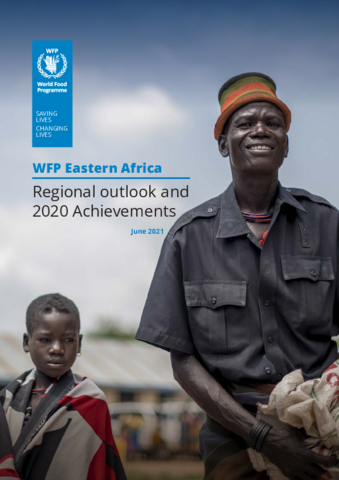
The year 2020 was an exceptional one following the outbreak of COVID-19. The unique challenges such as climatic shocks, conflicts, macroeconomic conditions coupled with COVID-19 led to a rapid increase in food insecurity, further aggravating the humanitarian needs in the region. Despite these challenges, WFP remained at the forefront delivering assistance, while supporting the response plans for the Governments in Eastern Africa Region.
WFP has continued to embrace and foster stronger partnerships with governments, communities, donors, and partners which have made a vital contribution to driving success in the region. The COVID-19 pandemic paved the way for new opportunities, including opportunities for new and stronger partnerships, with the aim of addressing the growing emergency needs. In addition, WFP’s joint partnerships resulted in enhanced information and food security analysis in urban areas, strengthening of social protection systems and the reopening of alternative transport corridors in the region.
Thanks to the generous contribution of donors, WFP in Eastern Africa was able to assist over 26 million people in 2020 − an increase of 11 percent from the 2019 cumulative figure. WFP prioritised lifesaving food assistance while also adapting its programmes to ensure that assistance is delivered in a safe, dignified, and accountable way. Working with partners, WFP supported governments in the Region to respond to COVID-19 by providing technical support to strengthen national social protection systems, and providing supply chain services to governments and the wider humanitarian community.
To contribute to increased resilience and long-term change in communities, WFP put greater emphasis on linking humanitarian assistance with development, by working with communities to create sustainable development activities that contribute to long- term resilience and enhance ability of communities to respond to shocks. In addition, WFP continued to engage at national level to inform national policies and strategies and enhance the capacity of national institutions for greater ownership and increased capacities to address food security challenges outlined in their development plans.
| Document | File |
|---|---|
| WFP Eastern Africa - Regional Outlook and 2020 Achievements - Emergency Preparedness and Response |
PDF | 1.18 MB
Download
|
| WFP Eastern Africa - Regional Outlook and 2020 Achievements - Environmental Management |
PDF | 1.05 MB
Download
|
| WFP Eastern Africa - Regional Outlook and 2020 Achievements - Food Systems |
PDF | 1.41 MB
Download
|
| WFP Eastern Africa - Regional Outlook and 2020 Achievements - Nutrition |
PDF | 873.04 KB
Download
|
| WFP Eastern Africa - Regional Outlook and 2020 Achievements - Partnership |
PDF | 524.13 KB
Download
|

